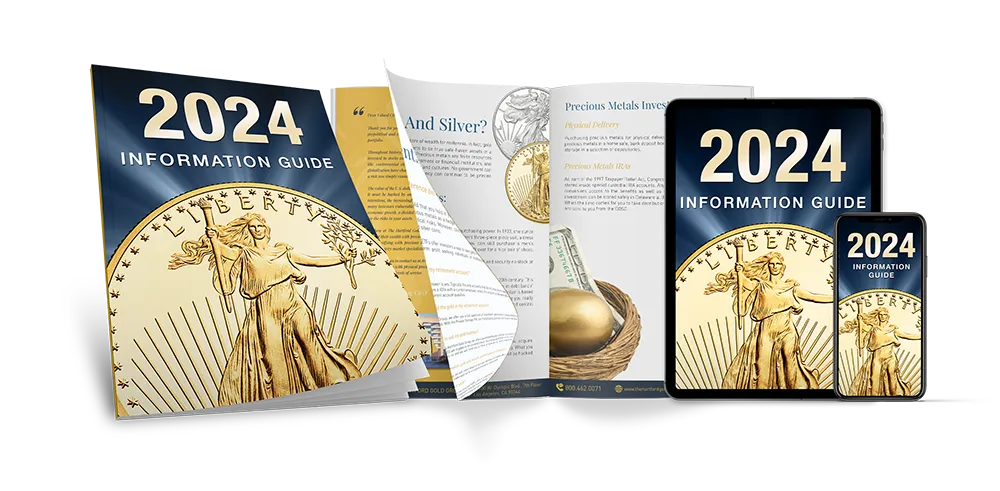In the face of economic downturns, knowing where to put your money during a recession is important for safeguarding and potentially growing your wealth. As the stock market experiences volatility and traditional investment avenues might seem less secure, understanding how to adapt your financial strategy becomes paramount.
We’ll guide you through various asset classes and historically proven resilient or profitable strategies during recessionary periods. From dividend stocks and consumer staples to healthcare and real estate, we’ll explore how diversification, focusing on sectors with strong balance sheets and cash flow, can help navigate the choppy waters of economic downturns.
We’ll also discuss the importance of evaluating your risk tolerance and long-term goals during a recession. Whether you’re experienced or just starting, understanding your options during a downturn is valuable in managing your finances effectively through the economic cycle.
What Is a Recession?
A recession is a period of significant economic decline that impacts various sectors of the economy and lasts for an extended period, typically several months or more. Officially, economists may define a recession as two consecutive quarters of harmful gross domestic product (GDP) growth, a primary indicator of economic activity.
During a recession, countries experience slow economic growth, reduced consumer spending, decreased industrial production, falling income, and rising unemployment rates. The stock market often becomes volatile, with stock prices generally declining as investors anticipate lower earnings and slower growth.
Recessions are a natural part of the economic cycle, characterized by alternating periods of expansion and contraction. Various factors can trigger a recession, including sudden economic shocks, financial crises, excessive debt accumulation, hiked interest rates, or bursting asset bubbles. The Federal Reserve and other central banks closely monitor these economic indicators and may adjust monetary policies, such as interest rates, to stabilize the economy.
During these times, businesses and individuals alike feel the pinch as sales decrease, credit becomes tighter, and the job market contracts. Understanding what a recession entails is important for effective financial planning and investment decisions, especially in seeking recession-resistant assets and strategies to weather the economic downturn.
What Contributes to a Recession?
Several factors contribute to a recession, often intertwining to create a complex economic downturn. These can range from sudden disruptions in supply and demand to broader financial crises and policy decisions like interest rate adjustments. Understanding these elements provides a clearer picture of the forces that can push an economy into a recession.
Supply and Demand Shocks
Supply and demand shocks are sudden and unexpected events that disrupt the economic equilibrium. A supply shock, such as a dramatic increase in oil prices or a natural disaster that halts production, can lead to higher costs for goods and services, reducing consumer spending and business profits.
For example, the 1970s oil crisis created a supply shock that significantly increased energy prices, contributing to a recession. On the other hand, a demand shock occurs when a sudden drop in consumer and business spending occurs.
The COVID-19 pandemic is a prime example, where lockdowns and health fears drastically reduced demand for various services and products, leading to a sharp economic contraction.
Financial Crisis
Financial crises can significantly contribute to recessions by eroding confidence in the financial system, leading to reduced lending, spending, and investment. Emergencies may arise from various sources, such as the collapse of a significant financial institution, a sudden burst of an asset bubble, or a systemic failure within the banking sector.
The 2008 Global Financial Crisis, triggered by the collapse of the housing market and the subsequent meltdown of financial institutions holding mortgage-backed securities, is a stark example. The crisis led to a severe credit crunch, widespread layoffs, and a prolonged economic downturn.
High Interest Rates
High interest rates, often set by the Federal Reserve or central bank as a measure to combat inflation, can also contribute to a recession. When borrowing costs increase, consumers and businesses may reduce spending.
This reduction in economic activity can slow down growth and, if prolonged, lead to a recession. For example, in the early 1980s, the Federal Reserve dramatically increased interest rates to combat high inflation, which led to a severe recession. While effective in lowering inflation, the high rates also increased the cost of borrowing, reducing consumer spending and business investment and, ultimately, a significant economic contraction.
Which Assets Do Well During a Recession?
During economic downturns, strategic asset acquisition becomes essential for safeguarding personal finances. A recession often triggers market volatility and bear market conditions, where stock prices fall 20 percent or more from recent highs, significantly affecting asset portfolios.
Identifying and purchasing assets that are relatively recession-proof or that outperform during these times is essential. These assets can provide stability, hedge against inflation, or even offer growth when other investments are declining.
Here’s a closer look at some of the assets and purchases that do well during a recession:
Precious Metals
Precious metals like gold and silver are renowned for their stability and resilience during economic downturns. They are considered a hedge against inflation and currency devaluation, often seeing an increase in value when purchases decline.
This makes them a crucial asset class for diversification in a recession. Beginners looking to purchase precious metals can explore coins or bars. For those concerned about the stock market’s volatility or the declining value of currency, precious metals can offer a tangible asset that has historically maintained its value through various economic cycles.
Health Care Stocks
The healthcare sector remains strong during recessions due to consistent medical services and product demand. Acquiring high-quality healthcare stocks, particularly those with strong balance sheets, steady cash flow, and a history of paying dividends, can buffer against market downturns.
These companies are usually involved in developing essential drugs, providing critical healthcare services, or manufacturing medical devices, all of which remain in demand regardless of economic conditions.
For beginners, healthcare mutual funds or ETFs (exchange-traded funds) can be an excellent way to gain diversified exposure to this sector without analyzing individual stocks. This can be done using a brokerage or financial advisor. While healthcare stocks can still experience volatility, their fundamental demand makes them a comparatively safer investment during economic downturns.
Real Estate
Real estate can provide both stability and income during a recession. While some real estate market sectors might suffer during economic downturns, areas like residential rentals often see continued demand.
Healthcare real estate, such as hospitals and medical offices, also tends to remain stable due to the essential nature of healthcare services. Real estate investment trusts (REITs) allow investors to gain exposure to real estate without purchasing physical property. They offer liquidity benefits, regular income through dividends, and diversification across various properties and geographic locations.
For those new to real estate, publicly traded REITs can be an accessible way to include this asset in their portfolio, providing long-term growth and income potential.
High-Yield Savings Accounts
In economic uncertainty, preserving capital becomes as important as seeking growth. High-yield savings accounts provide a safe place to keep your money while earning higher interest rates than traditional ones. These accounts become particularly attractive when the Federal Reserve raises interest rates to tackle inflation, as banks often increase the interest rates on these savings accounts.
High-yield savings accounts offer liquidity, allowing you to access your funds when needed, and are FDIC-insured, providing an additional layer of security. High-yield savings accounts can be prudent, especially for beginners looking to maintain their capital’s value and receive some return during a recession.
Consumer Staples Stocks
Consumer staples are products that individuals need regardless of economic conditions, including food, beverages, household goods, and hygiene products. Stocks in this sector tend to be more stable during economic downturns than certain growth stocks because the demand for these essentials remains consistent.
Companies in the consumer staples sector often have strong balance sheets, constant cash flow, and a history of paying dividends, making them attractive to those looking for stability and income during volatile times. For beginners, a diversified ETF focusing on consumer staples can provide exposure to a range of companies in this sector, helping to reduce the risk associated with individual stocks.
Consumer staples can be a strategic move during a recession as they align with ongoing consumer needs, providing steady performance even in a bear market.
Government Bonds
Government bonds are considered one of the safest options, especially during recessions when people seek security. Bonds issued by the U.S. government, such as Treasury bonds, notes, and bills, are backed by the federal government’s credit, making them virtually risk-free in terms of default.
During recessions, when the Federal Reserve often lowers interest rates to stimulate economic activity, bond prices rise, providing capital appreciation to bondholders. Additionally, government bonds offer regular interest income, which can be a reliable source of cash flow in uncertain economic times.
Government bonds can be a haven to park their money, preserving capital while receiving a modest, stable return. They can be purchased directly through the Treasury or mutual funds and ETFs focusing on government bonds, offering flexibility and liquidity to suit various strategies and needs.
What Goals Should You Keep in Mind?
In the context of an uncertain economy and the possibility of a recession, setting clear goals is important for navigating the challenges and opportunities that arise. These goals should reflect your immediate needs and consider your long-term financial well-being.
Here are a few goals to keep in mind, especially during more challenging economic times:
Preservation of Capital
During a recession, one primary goal should be preserving your capital. This means protecting the value of your investments from significant losses. Traditionally lower-risk assets like high-quality bonds, dividend-paying utility stocks, or government securities can help safeguard your capital. This goal is important if you’re nearing retirement or need to access your funds in the short term.
Income Generation
With interest rates potentially fluctuating and some investments losing value during economic downturns, finding reliable sources of income is essential. Dividend-paying stocks, especially from sectors like consumer staples and healthcare, and interest from bonds and high-yield savings accounts can provide a steady income stream. This goal is crucial for individuals who rely on their assets for living expenses or those looking to supplement their income.
Growth for Long-Term Objectives
While short-term market conditions might be challenging, keeping an eye on your long-term goals is essential. This might mean continuing growth stocks or asset classes that have the potential to rebound and grow over time, even if they’re currently underperforming.
For younger people or those with a longer time horizon until retirement, keeping money in the market and contributing to retirement accounts like IRAs can be important for long-term growth.
Diversification to Mitigate Risk
Diversification is always a key goal, but it becomes even more critical during a recession. A well-diversified portfolio can help mitigate the risks associated with any single investment or market sector.
This means spreading your assets across various asset classes, industries, geographic regions, and investment vehicles. Diversification can help smooth out returns and reduce the impact of volatility on your overall portfolio.
The Bottom Line
As we’ve reviewed the various aspects of acquiring assets during a recession, it’s clear that a strategic, well-informed approach is essential. Understanding what a recession entails, recognizing the assets that traditionally withstand economic downturns, and maintaining clear goals are crucial to safeguarding your finances during uncertain times.
Purchasing precious metals, healthcare stocks, consumer staples, real estate, and high-yield savings accounts can provide stability, income, and potential growth even when volatile.
Preserving capital, generating income, ensuring long-term growth, diversifying your portfolio, and staying flexible are key goals guiding your decisions. Each person’s strategy will be unique and tailored to their risk tolerance, time horizon, and financial objectives. Regularly reviewing and adjusting your approach to changing market conditions and personal circumstances is also essential.
In times of economic uncertainty, the value of purchasing gold and silver becomes even more pronounced. American Hartford Gold stands ready to help you explore how precious metals can fit into your diversified strategy, offering a stable, tangible asset that has historically preserved wealth through various economic cycles.
With their expertise and a wide range of options, American Hartford Gold can guide you in making informed decisions that align with your goals of capital preservation, income generation, and long-term growth.
To purchase gold or silver and diversify your assets, contact us today.
Sources:
Recession Definition: What Is A Recession? | Forbes
What Causes a Recession? | Investopedia
7 Best Investments During a Recession | Investing | U.S. News






